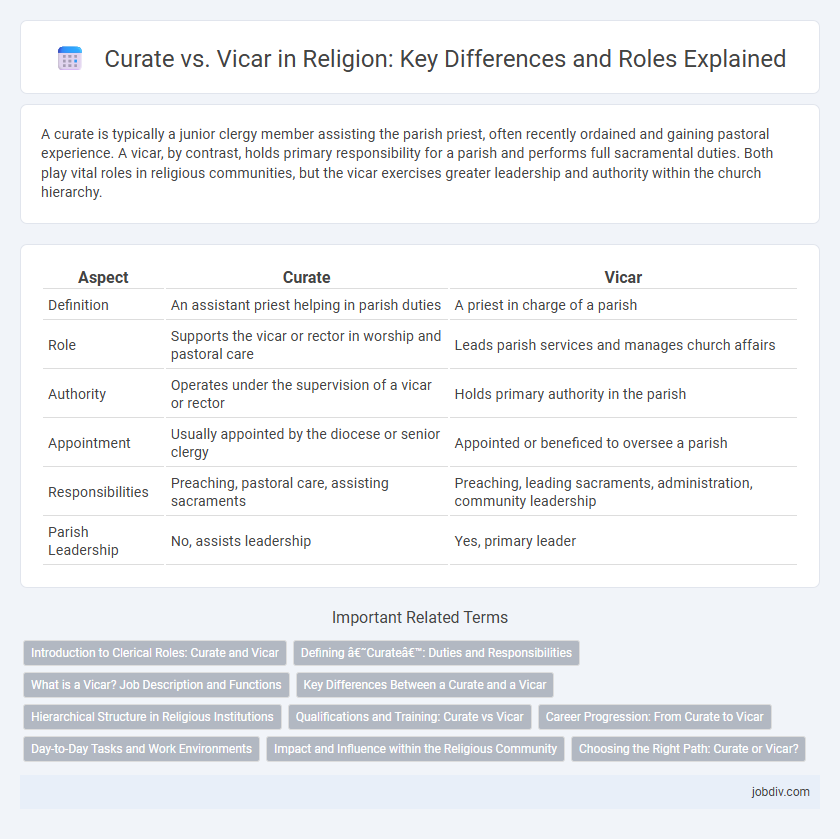A curate is typically a junior clergy member assisting the parish priest, often recently ordained and gaining pastoral experience. A vicar, by contrast, holds primary responsibility for a parish and performs full sacramental duties. Both play vital roles in religious communities, but the vicar exercises greater leadership and authority within the church hierarchy.
Table of Comparison
| Aspect | Curate | Vicar |
|---|---|---|
| Definition | An assistant priest helping in parish duties | A priest in charge of a parish |
| Role | Supports the vicar or rector in worship and pastoral care | Leads parish services and manages church affairs |
| Authority | Operates under the supervision of a vicar or rector | Holds primary authority in the parish |
| Appointment | Usually appointed by the diocese or senior clergy | Appointed or beneficed to oversee a parish |
| Responsibilities | Preaching, pastoral care, assisting sacraments | Preaching, leading sacraments, administration, community leadership |
| Parish Leadership | No, assists leadership | Yes, primary leader |
Introduction to Clerical Roles: Curate and Vicar
Curates are typically newly ordained clergy serving as assistants in a parish, gaining experience under the supervision of a vicar or rector. A vicar holds a more senior position with the responsibility of leading a parish and managing its spiritual and administrative needs. Understanding the distinction between a curate and a vicar is essential for grasping the hierarchical structure and roles within many Christian denominations.
Defining ‘Curate’: Duties and Responsibilities
A curate is a clergy member who assists the parish priest or vicar in performing religious services, pastoral care, and community outreach. Their duties often include leading worship, conducting baptisms, weddings, and funerals, and supporting the spiritual needs of the congregation. Curates are usually newly ordained priests gaining practical experience under the guidance of a vicar.
What is a Vicar? Job Description and Functions
A vicar is a representative of a parish appointed to perform spiritual and administrative duties on behalf of a bishop or church authority. Key functions include leading worship services, providing pastoral care, administering sacraments, and overseeing parish activities. Vicars play a crucial role in maintaining the spiritual well-being of their congregation and managing church operations.
Key Differences Between a Curate and a Vicar
A curate is typically an assistant clergy member in a parish, often newly ordained and serving under a vicar, while a vicar is the primary priest responsible for leading a parish and its congregation. Curates usually handle specific duties such as pastoral care and preaching, whereas vicars have broader responsibilities including administrative oversight and sacramental leadership. The key difference lies in authority and experience, with vicars holding incumbency and legal charge of the parish, unlike curates.
Hierarchical Structure in Religious Institutions
A curate typically serves as an assistant to a vicar within the hierarchical structure of Anglican and other Christian churches, supporting pastoral duties under the vicar's supervision. The vicar holds a more senior position, responsible for leading a parish and having spiritual and administrative authority over the curate. Hierarchically, the vicar acts as the primary clergy in charge, while the curate functions as subordinate clergy focused on assisting with religious services and community outreach.
Qualifications and Training: Curate vs Vicar
Curates typically undergo theological education followed by practical training under the supervision of an experienced priest, often as part of their ordination process. Vicars, having completed curacy, usually possess extensive ministerial experience and may pursue advanced theological studies or leadership training to oversee a parish. The qualification pathway differentiates curates as clergy in initial formation, while vicars hold established pastoral authority with full responsibility for congregational care.
Career Progression: From Curate to Vicar
A curate typically serves as an assistant to a vicar, gaining practical experience and developing pastoral skills within a parish. Progression from curate to vicar requires formal ordination, demonstrated leadership, and often additional theological training or diocesan approval. Becoming a vicar involves taking on full responsibility for a parish, including administrative duties, pastoral care, and community leadership.
Day-to-Day Tasks and Work Environments
Curates typically assist vicars by conducting services, preparing sermons, and providing pastoral care, often working under supervision in parish settings. Vicars oversee entire parish operations, manage administrative duties, lead worship services, and offer community leadership in churches or chaplaincies. While curates focus on learning and supporting roles within a church, vicars bear broader responsibilities for spiritual guidance and organizational management.
Impact and Influence within the Religious Community
Curates often serve as junior clergy, assisting vicars in pastoral care and community outreach, which allows them to build foundational relationships and gain practical experience that shapes their future leadership roles. Vicars hold primary responsibility for parish leadership, guiding religious services, community programs, and spiritual development, thereby exerting significant influence on the religious community's cohesion and growth. The distinct roles of curates and vicars collectively contribute to a dynamic ecclesiastical structure, ensuring sustained impact through mentorship and authoritative guidance.
Choosing the Right Path: Curate or Vicar?
Choosing the right path between curate and vicar involves understanding their distinct roles within church leadership. A curate typically assists with pastoral duties under a vicar's supervision, gaining experience in liturgical functions and community care. Opting to become a vicar signifies readiness to lead a parish independently, overseeing spiritual guidance, administration, and outreach initiatives.
Curate vs Vicar Infographic

 jobdiv.com
jobdiv.com